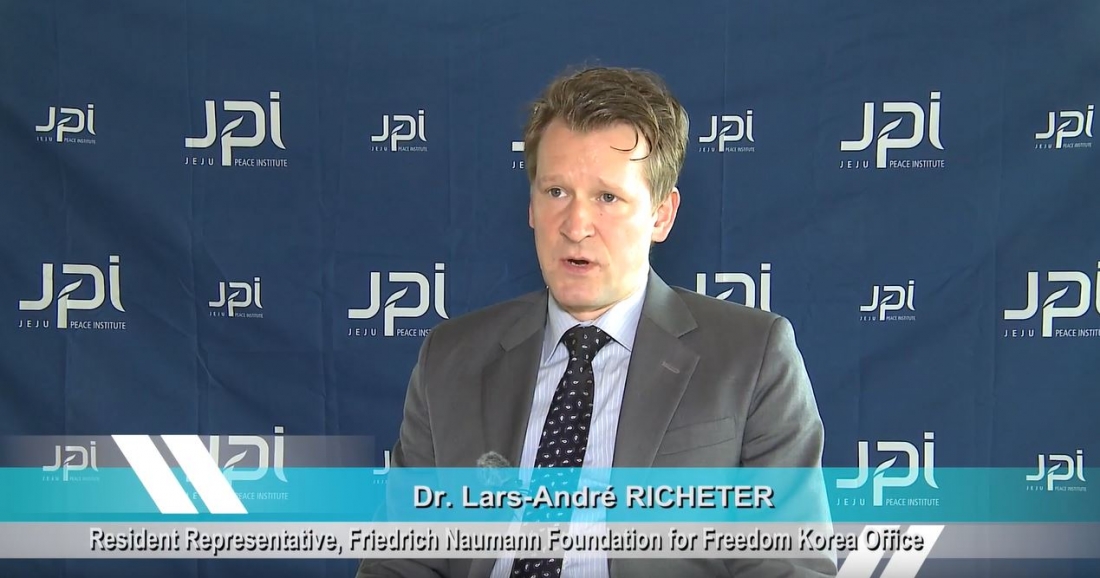
[Integration of Political and Economic Migrants with Respect to Refugees in Europe and Korea]
Q1. What do you think of the integration of political and economic migrants with respect to refugees in Europe and Korea?
The issue of refugees is a complicated question. It depends whether the migration is political or economic. Refugee and migration issues has been a topic for thousands of years, and will remain a challenge. Europe was and still is facing the serious crisis that started in late summer 2015. The peak is maybe over, but Europe has a lot of instability at its borders with Northern Africa, the Middle East, and even Eastern Europe. The wave of migrants in 2015 won’t be the last refugee crisis and we have to find more solutions. Europe needs to solve the issue at the ground level.
In terms of Asia, especially the Korean Peninsula, we have different issues. The issue of refugees from North Korea, living in China mainly, is an ongoing story. Maybe you can learn how to deal with that by observing and analyzing the German case since there were very many refugees from the former German Democratic Republic (East Germany) to the former Federal Republic of Germany (West Germany), especially in the 1950s, before the wall was built.
[On peace]
Q1. What do you think is an effective approach for local government to help upgrade the Jeju Forum to a world class level? How can Jeju Forum become a better venue for international conferences?
First of all, my impression is quite positive when it comes to Jeju as a venue for international conferences. I have been here quite often, including at the Jeju Forum for Peace and Prosperity. Jeju as a whole is doing a lot to attract international guests—not only tourists, but especially high-level guests from politics, economics, the media, social leadership, science. I think your work as promoters of the island is quite professional. You’re praising, for good reason, its geographic centrality. It’s close not only to Seoul but also Tokyo, Beijing, Shanghai, and Taipei. It’s a geographical center of Northeast Asia. You could do even more—you have two excellent conference venues.
Q2. What role might think tanks play in peace promotion?
They play a significant role. Think tanks, especially if they are independent, can approach a problem without any deadlines or restrictions, so they can think deeply and analytically and debate freely. That is a big advantage. If they have a network or partners, think tanks can work to implement their ideas and put them into practice. In general think tanks play an important role in politics or foreign politics for other areas of human life. That goes for questions of peace as well.
* Dr. Lars André RICHETER is the resident representative of the Friedrich Naumann Foundation for Freedom Korea Office.
Dr. Lars André RICHETER discussed how even though the peak of the migration crisis in Europe has probably passed, the EU still faces instability at its borders with Northern Africa, the Middle East, and even Eastern Europe. He suggested that the solution must occur at the ground level. The Korean Peninsula faces a migration challenge of its own, in terms of refugees coming from North Korea. Dr. RICHETER suggested studying divided Germany’s experience with refugees to apply to the Korean migration issue.
Dr. RICHETER also discussed the role of multilateral dialogue in international peace. For example, he pointed to Jeju’s work to attract international guests—not only tourists, but also high-level guests from the fields of politics, economics, the media, social leadership, and science. He added that Jeju’s geographical centrality in Northeast Asia makes it an ideal location for convening international conferences. Additionally, Dr. RICHETER discussed how think tanks, especially if they are independent, can play a role in promoting peace, because they can think deeply and analytically and debate freely, and then employ their networks to help implement new ideas into policy.
